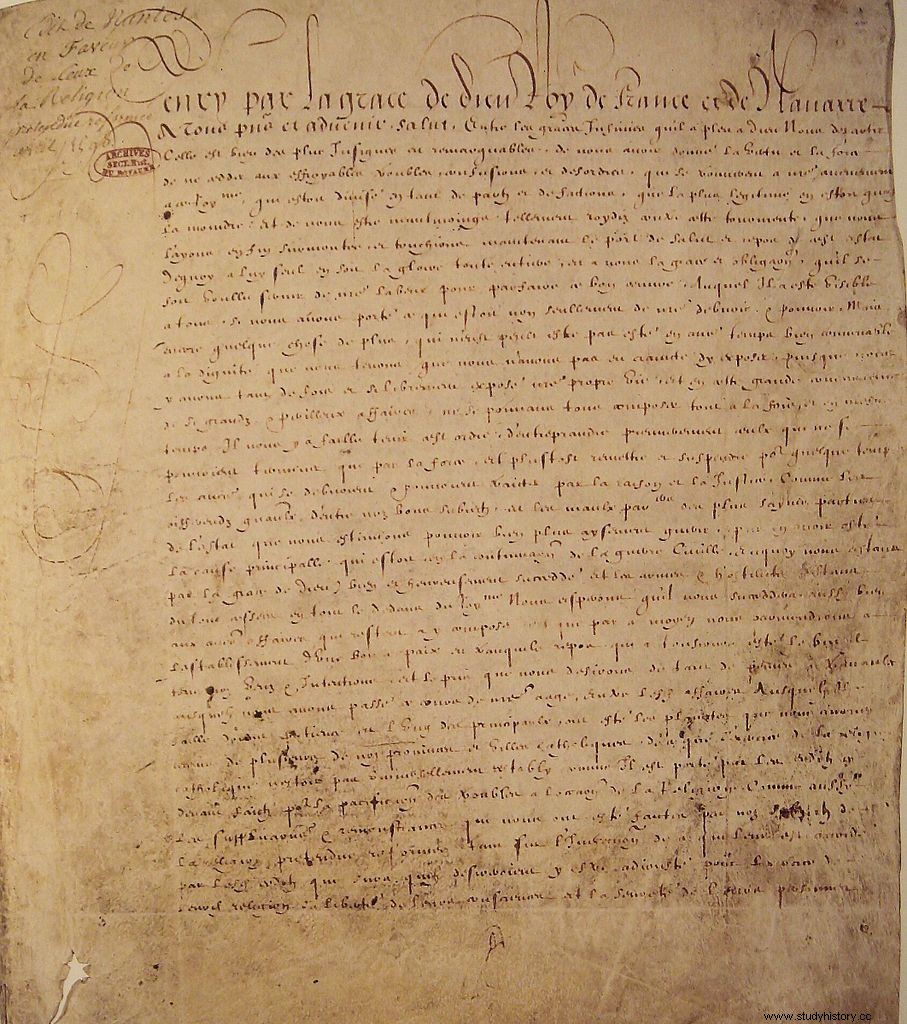The massacre of Protestants at Wassy under the aegis of the Duke of Guise triggers, in France, the 1 st March 1562, a real war of religion. The legitimate heir under Salic law (which contains the rules of succession to the throne of France), Henry IV, who was first a Protestant leader, must, to ascend the throne, renounce his Protestant faith for Catholicism, religion of the kings of France, July 25, 1593 in Saint-Denis.
France has suffered the horrors of interreligious conflicts for 36 years, and the kingdom is wavering. In 1595, the victory of Henri IV over the troops of the Catholic League (a group whose goal was to defend Catholicism against Protestantism, led by the Duke of Guise) set France on the path to peace. The king therefore decides to sign a compromise between Protestantism and Catholicism in order to pacify the state.
1598

Characters
Henry IV
Henri de Lorraine said Duke of Guise
Philippe-Emmanuel of Lorraine known as Duke of Mercœur
Procedure
Henri IV arrived in Nantes on April 13, 1598. The next day, he solemnly entered the cathedral where he was officially received. Indeed, the conflict between him and the Duke of Mercœur, one of the last members of the Catholic League, is now over.
Henri IV signed the Edict of Nantes fifteen days later, on April 30, 1598, at the castle of the Dukes of Brittany. The text has a preamble, 92 articles, 56 secrets, as well as the patent of the pastors and the patent of the garrisons. It allows Protestant worship in France with a certain freedom of conscience, unlike other countries in Europe. However, regions strongly steeped in Protestantism must do the same towards Catholics. Baptisms or forced conversions are prohibited. Protestants obtain equality of education, civic equality with Catholics and they can now hold office. There is also a list of places of "safety", 150 refuges including 51 strongholds (La Rochelle, Niort, Royan, Alès, Montpellier, etc.), in order to guarantee the safety of Protestants, where they can take refuge in the event of resumption of fights. These places constitute, according to some, a "State within the State". bearnais.
Consequences
The Edict of Nantes angered Pope Clement VIII, who outlawed freedom of conscience. This text is a sign of France's tolerance towards freedom of worship; but above all, the edict puts an end to the wars of religion which had weakened the country for 36 years. Thus, he aims, according to the king's own words, at "the establishment of a good peace and quiet rest" in the kingdom. It is also a guarantee of stability with a view to creating an alliance with the Kingdom of Spain (with whom peace will be signed in June 1598). But if, for two centuries, this edict remained more or less in force, despite the resumption of community conflicts that took place under Louis XIII, it was revoked, two centuries later, by Louis XIV, in 1685.
